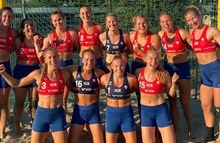
Excerpt from the fall 2021 issue of The Extension
If you are a typical retiree, you have been spending more time at home than usual. No recreational shopping, no lunching with friends, reduced travelling. Some of us fill the time with worthy activities like cleaning the garage or basement, gardening, reading important books, or volunteering at the food bank. Others have increased their TV time. This summer the Olympics offered a huge improvement over the usual news-oriented daytime fare. As a viewer, I was often struck by how few clothes the women athletes were wearing. Female beach volleyball players are a notable example. Their often very revealing bikinis look out of place for an international athletic competition. The men play the same sport dressed in jerseys and loose-fitting shorts. Women’s gymnastics’ costumes are colorful, sparkly, and sparse. By way of contrast the German team sported full-length leotards, but since they didn’t make the finals not everyone saw them.
In some Olympic sports, skimpy uniforms are specified and required for international competition. The International Handball Federation mandates that women’s beach handball players must wear bikini bottoms “with a close fit and cut on an upward angle toward the top of the leg.” The sides can measure no more than four inches.
When the Norwegian team wore shorts to the bronze medal match, they were fined 1,500 euros. In countries where modesty is emphasized, many young women don’t take up the sport because of the requirement for bikini bottoms and sports bra tops.
It’s not unusual for spectators to take embarrassing photos and post them on social media. Naomi Mataua Aasa, who plays for the American Samoan team, told The New York Times: “The uniform rules indicate that we are there to put on a show rather than being marked as athletes equally.” Every athlete should be able to compete in uniforms appropriate for their sport that meet basic standards for modesty.

